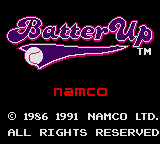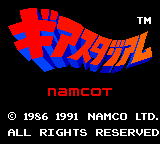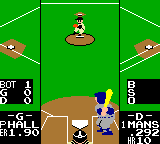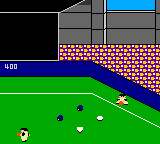Batter Up (Game Gear)
From Sega Retro
| |||||||||||||||
| Batter Up | |||||||||||||||
|---|---|---|---|---|---|---|---|---|---|---|---|---|---|---|---|
| System(s): Sega Game Gear | |||||||||||||||
| Publisher: Namco (JP)
Namco Hometek (US) | |||||||||||||||
| Developer: Namco | |||||||||||||||
| Peripherals supported: Gear-to-Gear Cable | |||||||||||||||
| Genre: Sports[1] (baseball) | |||||||||||||||
| Number of players: 1-2 | |||||||||||||||
|
Batter Up, known as Gear Stadium (ギアスタジアム) in Japan, is a baseball game developed and published by Namco for the Sega Game Gear. It is a handheld entry in Namco's World Stadium series, itself inspired by the earlier Family Stadium series for the Famicom, whose first entry, Pro Yakyuu Family Stadium, dates back to 1986. Players have a cartoonish, "super deformed" appearance.
An updated version titled Gear Stadium Heiseiban (ギアスタジアム平成版) was released in Japan in 1995.
Contents
Gameplay
The game follows the rules of baseball. Players choose from 14 fictional "Namco League" teams, each with their own unique players and statistics. Players pick their starting pitchers, the length of the game (5 or 9 innings), and the venue (Park or City). The Park venue is a standard-size stadium with artificial turf and a view of the nearby marina. The City venue is a smaller stadium with high walls that make hitting home runs more difficult. There is a mercy rule that ends the game early if one team is ahead by 10 or more points by the middle of the game.
In one-player games, the player chooses a team and plays up to 15 games against the computer. The first 13 games are against the other selectable teams, and the last two games are against the unselectable "P" and "A" teams. The same pitcher cannot start two games in a row. The game ends if the player loses a game. It can be continued using a four-character password given at the end of every victorious game. In two-player games (using a Gear-to-Gear Cable), players choose different teams and play a single game against each other. The first player to press START is player one and decides the length of the game and the stadium.
Teams
Most of the teams are anonymous stand-ins for the teams of the Nippon Professional Baseball league.
| G | |
|---|---|
| Based on the Yomiuri Giants. | |
| D | |
| Based on the Chunichi Dragons. | |
| C | |
| Based on the Hiroshima Toyo Carp. | |
| W | |
| Based on the Yokohama Taiyo Whales. | |
| S | |
| Based on the Yakult Swallows. | |
| T | |
| Based on the Hanshin Tigers. | |
| M | |
| A Major League Baseball all-star team. | |
| L | |
| Based on the Seibu Lions. | |
| Bu | |
| Based on the Kintetsu Buffaloes. | |
| B | |
| Based on the Orix Braves. | |
| F | |
| Based on the Nippon-Ham Fighters. | |
| H | |
| Based on the Fukuoka Daiei Hawks. | |
| O | |
| Based on the Lotte Orions. | |
| N | |
| A Nippon Professional Baseball all-star team. | |
| P | |
| The penultimate opponent in the single-player series. | |
| A | |
| The final opponent in the single-player series. |
Versions
Localised names
| Language | Localised Name | English Translation |
|---|---|---|
| English (US) | Batter Up | Batter Up |
| Japanese | ギアスタジアム | Gear Stadium |
Magazine articles
- Main article: Batter Up (Game Gear)/Magazine articles.
Promotional material
also published in:
- Electronic Gaming Monthly (US) #27: "October 1991" (1991-xx-xx)[4]
- GamePro (US) #29: "December 1991" (1991-xx-xx)[5]
Physical scans
| Sega Retro Average | |||||||||||||||||||||||||||||||||||||||||||||||||||||||||||
|---|---|---|---|---|---|---|---|---|---|---|---|---|---|---|---|---|---|---|---|---|---|---|---|---|---|---|---|---|---|---|---|---|---|---|---|---|---|---|---|---|---|---|---|---|---|---|---|---|---|---|---|---|---|---|---|---|---|---|---|
|
| 73 | |
|---|---|
| Based on 11 reviews | |
Technical information
ROM dump status
| System | Hash | Size | Build Date | Source | Comments | |||||||||
|---|---|---|---|---|---|---|---|---|---|---|---|---|---|---|
| ? |
|
128kB | Cartridge (JP) | |||||||||||
| ? |
|
128kB | Cartridge (US/EU) |
References
- ↑ 1.0 1.1 http://sega.jp/fb/segahard/gg/soft_licensee.html (Wayback Machine: 2013-01-01 20:24)
- ↑ Electronic Gaming Monthly, "October 1991" (US; 1991-xx-xx), page 27
- ↑ 3.0 3.1 GamePro, "January 1992" (US; 199x-xx-xx), page 132
- ↑ Electronic Gaming Monthly, "October 1991" (US; 1991-xx-xx), page 139
- ↑ GamePro, "December 1991" (US; 1991-xx-xx), page 93
- ↑ Beep! MegaDrive, "May 1991" (JP; 1991-04-08), page 28
- ↑ Consoles +, "Novembre 1991" (FR; 1991-11-07), page 133
- ↑ Console XS, "June/July 1992" (UK; 1992-04-23), page 147
- ↑ Game Zone, "June 1992" (UK; 1992-05-20), page 72
- ↑ Hippon Super, "May 1991" (JP; 1991-04-04), page 42
- ↑ Joystick, "Juillet/Août 1991" (FR; 1991-0x-xx), page 172
- ↑ Sega Power, "December 1991" (UK; 1991-10-30), page 43
- ↑ Sega Pro, "Christmas 1991" (UK; 1991-12-12), page 71
- ↑ Sega Pro, "April 1993" (UK; 1993-03-11), page 74
- ↑ Sega Saturn Magazine, "September 1995" (JP; 1995-08-08), page 88
| Batter Up (Game Gear) | |
|---|---|
|
Main page | Comparisons | Hidden content | Magazine articles | Reception | |












